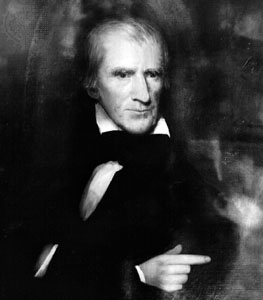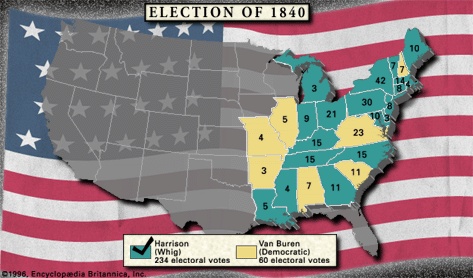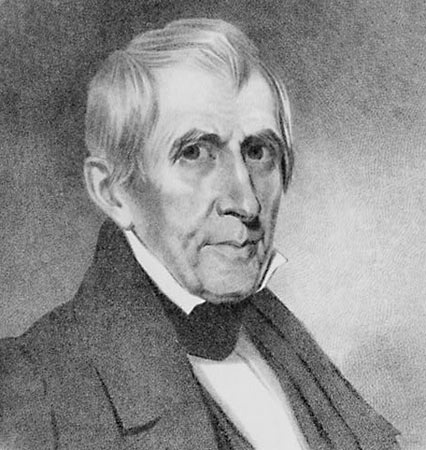Harrison, William Henry
president of United States
born February 9, 1773, Charles City county, Virginia 【U.S.】
died April 4, 1841, Washington, D.C., U.S.
 Cabinet of President William Henry Harrisonninth president of the United States (1841), whose Indian campaigns, while he was a territorial governor and army officer, thrust him into the national limelight and led to his election in 1840. He was the oldest man, at age 67, ever elected president up to that time, the last president born under British rule, and the first to die in office—after only one month's service. His grandson Benjamin Harrison (Harrison, Benjamin) was the 23rd president of the United States (1889–93). (For a discussion of the history and nature of the presidency, see presidency of the United States of America. See also Cabinet of President William Henry Harrison.)
Cabinet of President William Henry Harrisonninth president of the United States (1841), whose Indian campaigns, while he was a territorial governor and army officer, thrust him into the national limelight and led to his election in 1840. He was the oldest man, at age 67, ever elected president up to that time, the last president born under British rule, and the first to die in office—after only one month's service. His grandson Benjamin Harrison (Harrison, Benjamin) was the 23rd president of the United States (1889–93). (For a discussion of the history and nature of the presidency, see presidency of the United States of America. See also Cabinet of President William Henry Harrison.)Born at Berkeley, a Virginia plantation, Harrison was descended from two wealthy and well-connected Virginia families. His father, Benjamin Harrison, was a signer of the Declaration of Independence and a member of the Continental Congress. A brother, Carter Bassett Harrison, served six years in the House of Representatives. William Henry Harrison attended Hampden-Sydney College in 1787, then studied medicine in Richmond, Virginia, and in Philadelphia with Benjamin Rush (Rush, Benjamin).
At age 18 Harrison enlisted as an army officer, serving as an aide-de-camp to General Anthony Wayne (Wayne, Anthony), who was engaged in a struggle against the Northwest Indian Confederation over the westward encroachment of white settlers. Harrison took part in the campaign that ended in the Battle of Fallen Timbers (Fallen Timbers, Battle of) (August 20, 1794), near present-day Maumee, Ohio. He was named secretary of the Northwest Territory, a vast tract of land encompassing most of the future states of Ohio, Indiana, Michigan, Illinois, and Wisconsin, in 1798, and he was sent to Congress as a territorial delegate the following year. In May 1800 Harrison was appointed governor of the newly created Indiana Territory, where, succumbing to the demands of land-hungry whites, he negotiated between 1802 and 1809 a number of treaties that stripped the Indians of that region of millions of acres. Resisting this expansionism, the Shawnee intertribal leader Tecumseh organized an Indian uprising. Harrison, leading a force of seasoned regulars and militia, defeated the Indians at the Battle of Tippecanoe (Tippecanoe, Battle of) (November 7, 1811), near present-day Lafayette, Indiana, a victory that largely established his military reputation in the public mind. A few months after the War of 1812 (1812, War of) broke out with Great Britain, Harrison was made a brigadier general and placed in command of all federal forces in the Northwest Territory. On October 5, 1813, troops under his command decisively defeated the British and their Indian allies at the Battle of the Thames (Thames, Battle of the), in Ontario, Canada. Tecumseh was killed in the battle, and the British-Indian alliance was permanently destroyed; thus ended resistance in the Northwest.
 After the war, Harrison settled in Ohio, where he quickly became active in politics. He served in the U.S. House of Representatives (1816–19), the Ohio Senate (1819–21), and the U.S. Senate (1825–28) and as minister to Colombia (1828–29). In 1836 he was one of three presidential candidates of the splintered Whig Party, but he lost the election to Democrat Martin Van Buren (Van Buren, Martin). Nonetheless, his popular-vote totals were large enough to encourage him to make another attempt. In 1840 Harrison won the Whig nomination over Senator Henry Clay (Clay, Henry) of Kentucky, largely because of his military record and his noncommittal political views. In Harrison the Whigs believed they had found a new Andrew Jackson (Jackson, Andrew), attractive as a war hero and a frontiersman. He became, as a result, the first “packaged” presidential candidate, depicted as a simple soul from the backwoods. To pull in Southern Democrats, the Whigs nominated John Tyler (Tyler, John) of Virginia for vice president. Capitalizing on voters' distress over the severe economic depression caused by the panic of 1837, the campaign deliberately avoided discussion of national issues and substituted political songs, partisan slogans, and appropriate insignia: miniature log cabins and jugs of hard cider were widely distributed to emphasize Harrison's frontier identification, and the cry of “Tippecanoe and Tyler too” rang throughout the land, calling up Harrison's dramatic triumph on the field of battle 29 years earlier. These appeals triumphed, with Harrison winning 234 electoral votes to incumbent Martin Van Buren's 60.
After the war, Harrison settled in Ohio, where he quickly became active in politics. He served in the U.S. House of Representatives (1816–19), the Ohio Senate (1819–21), and the U.S. Senate (1825–28) and as minister to Colombia (1828–29). In 1836 he was one of three presidential candidates of the splintered Whig Party, but he lost the election to Democrat Martin Van Buren (Van Buren, Martin). Nonetheless, his popular-vote totals were large enough to encourage him to make another attempt. In 1840 Harrison won the Whig nomination over Senator Henry Clay (Clay, Henry) of Kentucky, largely because of his military record and his noncommittal political views. In Harrison the Whigs believed they had found a new Andrew Jackson (Jackson, Andrew), attractive as a war hero and a frontiersman. He became, as a result, the first “packaged” presidential candidate, depicted as a simple soul from the backwoods. To pull in Southern Democrats, the Whigs nominated John Tyler (Tyler, John) of Virginia for vice president. Capitalizing on voters' distress over the severe economic depression caused by the panic of 1837, the campaign deliberately avoided discussion of national issues and substituted political songs, partisan slogans, and appropriate insignia: miniature log cabins and jugs of hard cider were widely distributed to emphasize Harrison's frontier identification, and the cry of “Tippecanoe and Tyler too” rang throughout the land, calling up Harrison's dramatic triumph on the field of battle 29 years earlier. These appeals triumphed, with Harrison winning 234 electoral votes to incumbent Martin Van Buren's 60.Harrison was the first president-elect to travel by railroad to Washington, D.C., for his inauguration. Wearing no gloves and no overcoat despite the freezing weather, he rode up Pennsylvania Avenue on a white horse to take the oath of office on March 4, 1841. It was said that he was as pleased with the presidency “as a young woman with a new bonnet.” In the cold drizzle he delivered an inaugural address (see original text (William Henry Harrison: Inaugural Address)) that lasted almost two hours. In it he highlighted a common Whig concern—“executive usurpation”—and reconfirmed his belief in a limited role for the U.S. president. He said he would serve but one term, limit his use of the veto, and leave revenue schemes to Congress. The address was circulated to some parts of the country by railroad; for the first time, people outside Washington could read the president's words the same day they were uttered.
 Harrison was soon overwhelmed by office seekers. He was thoroughly dominated by the better-known leaders of his party—Daniel Webster (Webster, Daniel), whom he appointed secretary of state, and Henry Clay (Clay, Henry). His relations with Clay were embittered, as Clay then preferred to wield power as leader of the Whigs in Congress. Once when Clay was pressing his opinions on him, Harrison responded, “Mr. Clay, you forget that I am president.” Harrison tried to do everything expected of him, even trudging around Washington to purchase supplies for the White House. But a cold he had contracted on inauguration day developed into pneumonia, and he died just a month later, on April 4, bringing “His Accidency,” John Tyler, to the presidency. The first president to lie in state in the Capitol, Harrison was buried in Washington. In June his remains were reinterred in what is now the William Henry Harrison Memorial State Park in North Bend, Ohio.
Harrison was soon overwhelmed by office seekers. He was thoroughly dominated by the better-known leaders of his party—Daniel Webster (Webster, Daniel), whom he appointed secretary of state, and Henry Clay (Clay, Henry). His relations with Clay were embittered, as Clay then preferred to wield power as leader of the Whigs in Congress. Once when Clay was pressing his opinions on him, Harrison responded, “Mr. Clay, you forget that I am president.” Harrison tried to do everything expected of him, even trudging around Washington to purchase supplies for the White House. But a cold he had contracted on inauguration day developed into pneumonia, and he died just a month later, on April 4, bringing “His Accidency,” John Tyler, to the presidency. The first president to lie in state in the Capitol, Harrison was buried in Washington. In June his remains were reinterred in what is now the William Henry Harrison Memorial State Park in North Bend, Ohio. Harrison's wife was Anna Symmes Harrison (Harrison, Anna), who had been born in New Jersey of a well-connected family; her father served as chief justice of the New Jersey Supreme Court. During the American Revolution, when the British occupied New Jersey, her father smuggled her, then an infant, through enemy lines to her grandparents' home on Long Island, New York, where she grew up. She received elite schooling there and later in New York City. Her father opposed her marriage to Harrison, but he became reconciled as Harrison rose to prominence. She had not accompanied Harrison to Washington, intending to follow him to the White House later to take up her role as first lady. At first she had enthusiastically supported Harrison's electioneering, seemingly eager to greet visitors who flocked to their home in North Bend. But when one of the Harrisons' sons, his namesake, died in 1838, she fell into depression, even questioning her husband's zeal to be president at his advanced age. Accompanying Harrison to the capital and intending temporarily to substitute for his wife as hostess was a daughter-in-law, his son's widow, Jane Irwin Harrison.
Harrison's wife was Anna Symmes Harrison (Harrison, Anna), who had been born in New Jersey of a well-connected family; her father served as chief justice of the New Jersey Supreme Court. During the American Revolution, when the British occupied New Jersey, her father smuggled her, then an infant, through enemy lines to her grandparents' home on Long Island, New York, where she grew up. She received elite schooling there and later in New York City. Her father opposed her marriage to Harrison, but he became reconciled as Harrison rose to prominence. She had not accompanied Harrison to Washington, intending to follow him to the White House later to take up her role as first lady. At first she had enthusiastically supported Harrison's electioneering, seemingly eager to greet visitors who flocked to their home in North Bend. But when one of the Harrisons' sons, his namesake, died in 1838, she fell into depression, even questioning her husband's zeal to be president at his advanced age. Accompanying Harrison to the capital and intending temporarily to substitute for his wife as hostess was a daughter-in-law, his son's widow, Jane Irwin Harrison.Additional Reading
A collection of Harrison's writings from when he was governor of Indiana Territory can be found in Logan Esarey (ed.), Messages and Letters of William Henry Harrison, 2 vol. (1922, reprinted 1975). Biographies include Dorothy Burne Goebel, William H. Harrison: A Political Biography (1926); Freeman Cleaves, Old Tippecanoe: William Henry Harrison and His Time (1939, reissued 1990); and James A. Green, William Henry Harrison: His Life and Times (1941). Harrison's brief service in office, as well as the administration of his successor, is examined in Norma Lois Peterson, The Presidencies of William Henry Harrison & John Tyler (1989), with a useful bibliography.The life and goals of Tecumseh are viewed in a fresh light today, especially in R. David Edmunds, Tecumseh and the Quest for Indian Leadership (1984). The struggle between Harrison and his Indian foes is handled imaginatively in James A. Huston, Counterpoint: A Novel of Tecumseh vs. William Henry Harrison (1987).
- Velde, Esaias van de
- Velde, Henry van de
- Velenje
- veliger
- Veliki Preslav
- Velikiye Luki
- Velikonda Range
- Veliko Tŭrnovo
- Velikovsky, Immanuel
- Veliky Knyaz Constantine
- Veliky Ustyug
- Velimir Vladimirovich Khlebnikov
- Velleius Paterculus
- Vellore
- Vellore Mutiny
- velocipede
- Velociraptor
- velocity
- Velsen
- Veltman, Martinus J.G.
- velvet
- velvet ant
- velvet crab
- velveteen
- velvet grass